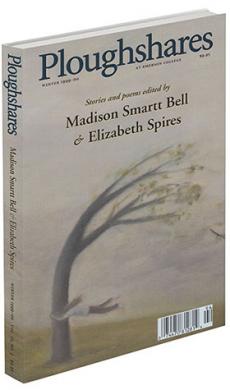rev. of How Aliens Think by Judith Grossman
How Aliens Think
Stories by Judith Grossman. The Johns Hopkins University Press, $22.50 cloth. Reviewed by Fred Leebron.
In her first story collection, Judith Grossman, author of the acclaimed 1988 novel
Her Own Terms, is boldly and decisively all over the map.
How Aliens Think consists of lively and intelligent stories that are sometimes metafictional, sometimes realistic, sometimes philosophical, and always entertaining. Grossman appears, from the evidence of this collection, to be both a writer who can write any kind of story and a thinker who can infuse any situation with intelligence and a compelling blend of distance and compassion.
“Rovera” is a wonderfully controlled and precise story about a new mother watching — as if through glass — the slow death of her tubercular husband, an affliction that could have been prevented. Despite her anger and resentment, and her increasing detachment from her husband, she cannot fail to see “that every breath he drew in frightened him, as if something might tear open inside. . . .
If he were a dog, the thought flitted through Vera’s mind, alone in the kitchen boiling up milk,
we’d have to be thinking about putting him down.”
The two central stories, “Spion Kop” and “How Aliens Think,” follow a young Englishwoman who first sleeps with her married lover’s brother and then immigrates to the United States in the hope of cementing a doomed relationship. These two fictions are clear-eyed and unsentimental, as “bad Susan” seeks a slice of peace and contentment in worlds from which she is clearly separate. The standing-room-only section of a Manchester United soccer game is a “vast, embittered, raging howl, with its feral descant of screams at the umpire . . . a slackening barrage of support and abuse.” Manhattan “is one continuing assault of explosive noise and motion — insane jackhammers going at you from this side, backhoes clawing and grinding in the lot across the street, sirens in perpetual spasm.” “There are aliens and non-aliens,” she knows, and ironically consoles herself that even Hawthorne was “so obviously not on to himself.” Ultimately, Susan is “like her fellow professional aliens”: “there’s no one to count on
understanding how it felt, floating absently across the world while empires foundered under them.”
In other stories, Grossman is more playful. “De Maupassant’s Lunch: An Education” traces the possible trajectory in which a disembodied hand once owned by the poet Swinburne falls into the French writer’s possession. “A Wave of the Hand” posits the idea that it is possible to grow up in a household where the father is a woman dressed in man’s clothes, without anybody bothering to discuss or remark upon this fact. And in “From the Old World: Four Lives from a Saga,” ancillary uncles and aunts occupy center stage in an ironic and brief family epic about the everyday and the odd. Throughout, the language finds new ways to invent the old, as in this passing-on of one of the aunts: “And at some imperceptible moment in the next few hours, the kind Madge became as old as she would ever be.”
How Aliens Think is an eclectic and electric collection, in which every page carries both a shock of recognition and a jolt of something tantalizingly original and new. “It’s only to revise and set the record a little straighter,” the narrator in “Death of the Mother” notes, immediately prior to the parenthetical close: “(Narrator strikes fist over the heart).”
Fred Leebron is author of the novel Out West
and co-editor of Postmodern American Fiction: A Norton Anthology.
Knopf will publish his new novel, Six Figures,
in March 2000. He teaches at Gettysburg College.

